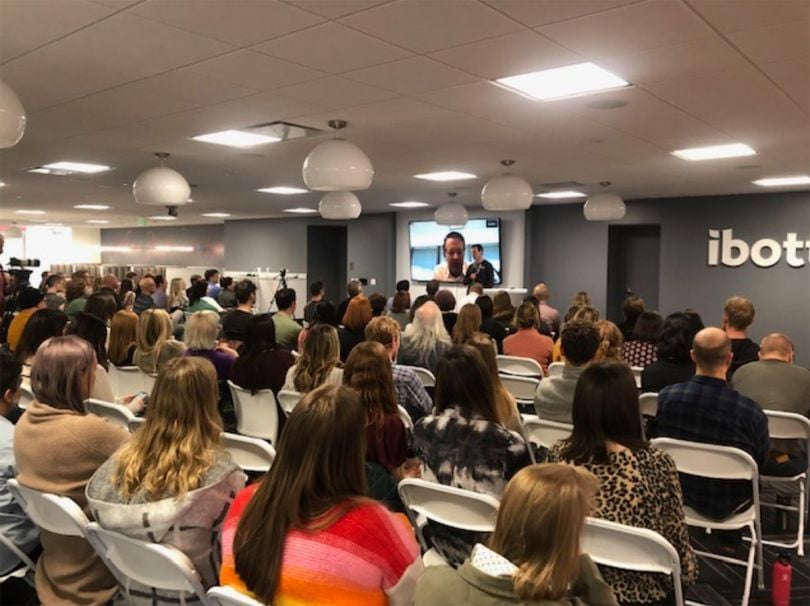Evolve or disappear. It’s the fundamental law of nature that hollowed out the bones of birds, painted bright colors on the backs of poison frogs, and gave humans the capacity to think, use tools, and — most critically — shape our own evolution.
Humans are not victims of random mutation, and neither are the companies they build — instead, they consciously lay the groundwork for deliberate evolution. Mastering adaptation is especially important for startups who intend to scale rapidly; to do that, they have to keep growing and evolving to better suit their market.
At cash back rewards platform Ibotta, the core data and analytics team is at the center of one such evolution.
Clever data scientists have spent many a morning molding code like clay to build out data sets and analytic tools. Ibottans are ready to move toward transforming that data into reliable, decision-driving insights for their company and its clients — all partners and the individual users getting cash back from their purchases. Through thoughtful application of a data-driven vision, Ibottans are paving the path of the company’s evolution.
“Something we really do well at Ibotta is having data to back up our decisions as we move forward,” said Senior Data Scientist Emily Kaegi. “That’s the cool part of data science — people like to build models and try to predict the future.” In this case, the team’s data is an evolutionary backbone, and their models of the present guide the direction of Ibotta’s growth.
In turn, Ibotta supports its team members in their drive to grow on a personal and professional level. When individuals are given the resources to take steps forward in their careers, they bring the whole company with them.
“Being part of a big analytics organization is amazing,” said Kaegi. “You have so many people with different backgrounds who are super smart that you can go to and ask questions and bounce ideas off. People get really excited about data.”
“Leadership approached me and asked: ‘Are you challenged enough?’”
What does evolving mean to you?
Technical Manager, Core Data and Analytics Maiia Hackler: On a personal level, evolving means becoming better today than we were yesterday. This can take so many different forms, such as evolving as a leader, manager or maybe just evolving as a technical expert. It can also mean coming up with new ideas on an individual team level or watching those ideas evolve into something greater and bigger.
In turn, the company evolves as new ideas come into being on a greater scale. Ibotta started as just an app, but look at it today — it’s represented as a mobile app, browser extension and web experience. Much more is on the way.
“Evolving means becoming better today than we were yesterday.”
What’s a way you’ve evolved individually working at Ibotta?
Kaegi: It’s made me a better communicator in general. If I’m communicating with the data team, especially if I’m really diving into something, I’ll say: Okay, take a step back. The team is not as deep in the problem, and I need to communicate with them. What are a couple of things that I can put into a quick Slack message instead of writing out paragraphs of information that I’ve looked at in the last hour?
Ibotta really helped me figure out how I can communicate something technical and complex to someone that wants the data, but doesn’t need to know any of the stats.
Data Scientist Josh Roberti: I actually come from an atmospheric science background, so a lot of the business concepts were brand new to me. Luckily, Ibotta has a really well-structured, 90-day onboarding process and that gave me all the tools I need to take things and run with it. Since I started, I went from learning and understanding the business to taking on smaller tasks to then leading different projects from start to end while communicating with stakeholders. And I think I’ve just become more adaptable — I’m still always learning stuff on the fly.
Hackler: I started with Ibotta about three years ago, as a senior decision scientist on the client analytics team. Things were pretty great. But then I was offered an opportunity to manage a newly created core data and analytics team. And at first I was like, well, I love my individual contributions — but then leadership approached me and asked: “Are you challenged enough?”
Now, I’ve got an opportunity to not just be a manager, but a technical manager — this is a hybrid of a people manager and individual contributor, and was a huge selling point for me. I dedicate my time to empowering my team — which is honestly more productive at the end of the day — and I still have the opportunity to keep my coding skills relevant. The company met me in the middle.

How has Ibotta supported your personal evolution?
Hackler: We have a great set of resources that are covered by Ibotta, including Coursera and Degreed, that we can absolutely explore — and we’re not limited in what we want to learn. We also have an opportunity to be a part of the mentorship program which is awesome. I’ve had a couple of mentors throughout my career, both technical and non-technical, which helps me to understand what I’m missing and what I can improve on. It’s a journey, and Ibotta supports us in a cultivating way
“I was like, okay, I gotta get learning and thinking about this to share back.”
Roberti: There’s always all these internal events or activities going on from a granular level. So on our team, we have weekly check-ins. We ask: “What are you working on?” “What are you going to be working on this week?” “What did you learn?” And that scales all the way up to senior leadership, too. They have weekly all hands and quarterly town halls, so we’re learning how our actions are really impacting the business as a whole.
Kaegi: This is my first week officially on Maiia’s team. The team really does go around and say, “All right, what did I learn last week?” I was like, okay, I gotta get learning and thinking about this to share back — which was cool, because it was awesome to hear what different people are focusing on. If I have a question, I can go to that person and say, “Hey, tell me more about what you learned.” The core data and analytics team specifically is also building out the center of excellence for analytics. We have a new person on the team who’s going to be looking across the organization and building out resources for best practices and trainings for all of analytics, which will be awesome.
What have you learned this week?
- Roberti: “I’m taking a Coursera course on Python, because I solely coded in R for so long. I’m learning that Python and R are actually very similar.”
- Kaegi: “I’ve been improving my time series modeling — looking at different statistical techniques to predict time series data into the future.”
- Hackler: “Our team is growing, so I’m reading a lot about advanced analytics and leading teams. But other than that, I’m learning on my own about data architecture.”

How do you keep an eye on the bigger picture while the company is evolving so rapidly?
Roberti: Effective communication. Because there are so many different teams working on different projects simultaneously, it can be easy to fall into the habit of either being siloed or duplicating work. I haven’t seen that happen too often here, which is great. A lot of it is people stepping back and communicating — and this is happening on different levels, within our own team and all the way up to senior leadership.
Kaegi: There was a time where we were trying to make a decision about how long to wait before savers get cash back from certain retailers. We brought together the analytics team to say, what would happen if we made this change? Do we think that savers would have a better experience and write into our care department less? Is it gonna take our product team one hour or three months to roll out this feature? And then there’s the fraud risk to consider — for example, if we give savers cash back too quickly and they cancel. So that requires four teams already, who all came into the meeting with their own opinion from their side of the business. We were able to all talk, lay out the pros and cons, and come together with a solution.
Hackler: We also have very good project management support, to make sure we’re not dropping any balls. Our leadership is trying to create this cross-collaboration environment, and because of all the awesome individuals on the team, we’re able to solidify strategies for all of Ibotta’s new products and capabilities.








